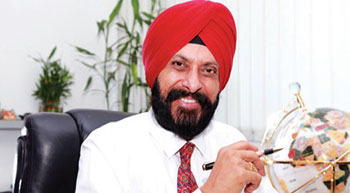Buoyed by the positive response from the industry and the proactive approach adopted by various state governments, India is now making rapid strides in the solar segment. The country's solar power generation has gone up 14 times in a span of just five years from 0.5 MW in 2011 to 7 GW now.
FlashNews:
Air India, Lufthansa Group Ink Landmark MoU to Boost India‑Europe Connectivity
GMRIT Achieves Deemed University Status, Strengthens Academic Expansion
India Adds Record 52.5 GW Power Capacity in FY2025‑26, Driven by Renewables
REC to Drive AI‑Powered Energy Innovation at India AI Impact Summit 2026
Inox Clean Energy, RJ Corp Enter Africa’s IPP Market, Target 2.5 GW by FY2029
Best Pills for Erection: Myths, Facts, and Smart Choices
Best Pills for Erection: Audience‑Specific Guidance with Safety Disclaimers
DIAL Launches Family@DEL: First Family‑Centric Travel Initiative at an Indian Airport
India’s SDHI Lands Landmark Oman Defence Ship Deal
Air India Unveils First Line‑Fit Boeing 787‑9, Signals Bold Global Transformation in 2026
Vizhinjam Expansion Strengthens India’s Maritime Competitiveness: Sonowal
Tata Power Odisha Discoms Secure Top National Rankings for Third Consecutive Year
SDHI Secures $227 Million Chemical Tanker Deal, Revives India’s Commercial Shipbuilding
India’s Energy Transition Sets Global Pace: Pralhad Joshi at Davos
IWDC Clears ₹15 Billion Projects to Boost Green Mobility, Cargo and River Tourism
World Bank Approves $815 Million Financing for Tata Power-DGPC Dorjilung Hydropower Project in Bhutan
Indian Railways Deploys Humanoid Robot ASC ARJUN at Visakhapatnam for Smart Station Security
India’s Power Grid Crosses 500,000 Circuit Km, Marks 71.6% Growth Since 2014
India Inc Optimistic on Growth, Flags Infrastructure, Defence and Export Priorities: FICCI Survey
Tag: Renewable Energy
A Sustainable Blueprint for Smart Cities
The Smart Cities Mission ensures that systems and regulations that balance growth, business friendliness and public interest are in place, say Upendra Joshi and Shivanshu Thaplyal.
India´s renewable energy potential is vast and untapped
India has 275 GW of installed electricity generating capacity which is significantly higher than 140 GW of peak demand of electricity across the country. The energy generated through coal alone is higher than its peak demand. Despite the installed capacity exceeding power demand, some parts of the country face acute power shortages and more than 300 million people in India are still without access to power.
ReNew Power awards 50 MW turnkey wind project
ReNew Power, a renewable energy company, has placed a 50 MW turnkey project order to Gamesa. The order will be likely be commissioned by March 2017. Gamesa will supply 25 units of G114 - 2.0MW T106 turbines which will be set up at Amba, Madhya Pradesh.
Coal India finds no takers for imported supplies
Minister of State for Coal, Power, Renewable Energy and Mines Piyush Goyal has said that no thermal power plant/coal company has approached CIL (Coal India Ltd) for supply of imported coal for 2016-17.
GST may be disruptive for the next two-three years for certain sectors
In general, our view is that GST is going to bring in a lot of efficiencies as far as logistics goes and logistics also has a direct bearing on the cost of some of these raw materials which are going to be core to the development of any infrastructure project.
Railway stations turn to solar energy
In order to reduce dependence on fossil fuels, the Ministry of Railways has planned to harness 1,000 MW of solar power through developer mode by putting up solar plants on railway buildings/stations and through land-based plants across the country.
EESL signs MoU with TERI
Energy Efficiency Services Limited (EESL) has entered into a strategic partnership with The Energy and Resources Institute (TERI) for two years. The MoU was signed between the two parties in the presence of Union Minister of State (IC) Power, Coal and New & Renewable Energy, Piyush Goyal.
L&T Infa Debt Fund to raise up to Rs.2,750 crore via bonds
With more leeway to fund projects and tax exemptions, L&T Infra Debt Fund (IDF), L&T Finance group's infrastructure refinancing arm, plans to raise up to Rs.2,750 crore through debentures.
Use green finance for cleaner coal
The Economic Survey 2015-16 has warned against a system of green financing in India that focuses solely on renewable energy and instead also wants investments in greening of coal power.






